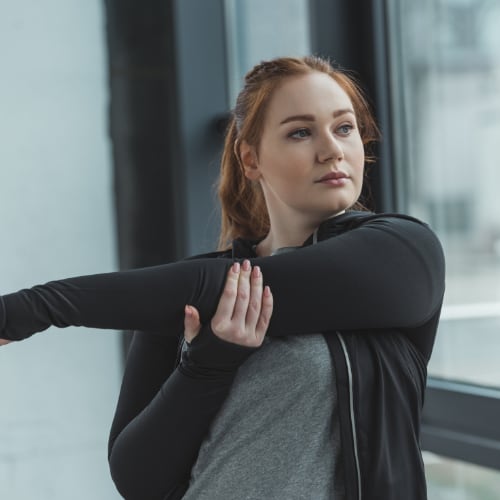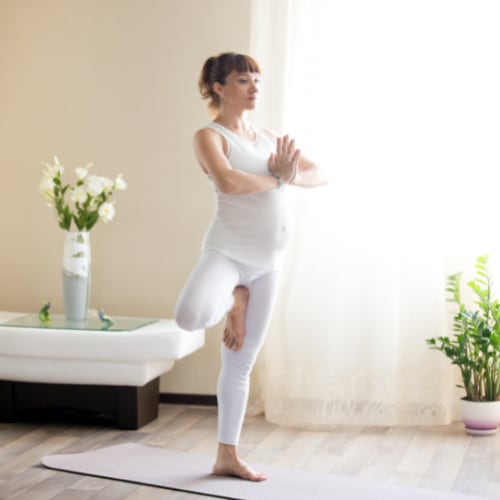 The Science of Movement: How It Shapes Body and Mind
The Science of Movement: How It Shapes Body and Mind
The Science of Movement: How It Shapes Body and Mind

-
Main Ideas
Learning Objective
Understand how physical activity supports brain health and emotional resilience across life stages, and recognize the unique benefits of walking and yoga for mental and physical well-being.
Behavioral Objective
Discover how physical activity enhances brain function and emotional resilience. Learn the benefits of walking and yoga for lifelong vitality.
Key Thought
Movement transforms the body and mind, unlocking health, focus, and emotional resilience at every stage of life.
-
Main Ideas
Learning Objective
Understand how physical activity supports brain health and emotional resilience across life stages, and recognize the unique benefits of walking and yoga for mental and physical well-being.
Behavioral Objective
Discover how physical activity enhances brain function and emotional resilience. Learn the benefits of walking and yoga for lifelong vitality.
Key Thought
Movement transforms the body and mind, unlocking health, focus, and emotional resilience at every stage of life.
-
Terms
- Cognitive Decline
noun
The gradual loss of thinking, memory, and reasoning abilities, often associated with aging or disease.
- Executive Functioning
noun
A set of mental skills, including memory, flexible thinking, and self-control, that enable goal-directed behavior.
- Mind-Body Connection
noun
The relationship between mental processes and physical health, emphasizing how thoughts and emotions influence the body.
- Neurodegenerative Diseases
noun
Conditions, such as Alzheimer's and Parkinson's, characterized by progressive loss of nerve cells and cognitive function.
- Neuroplasticity
noun
The brain's ability to reorganize and form new neural connections in response to learning, experience, or physical activity.
-
Terms
- Cognitive Decline
noun
The gradual loss of thinking, memory, and reasoning abilities, often associated with aging or disease.
- Executive Functioning
noun
A set of mental skills, including memory, flexible thinking, and self-control, that enable goal-directed behavior.
- Mind-Body Connection
noun
The relationship between mental processes and physical health, emphasizing how thoughts and emotions influence the body.
- Neurodegenerative Diseases
noun
Conditions, such as Alzheimer's and Parkinson's, characterized by progressive loss of nerve cells and cognitive function.
- Neuroplasticity
noun
The brain's ability to reorganize and form new neural connections in response to learning, experience, or physical activity.
Introduction
Movement is more than just a way to stay fit-it profoundly impacts our body and mind at every stage of life. From boosting brain development in the womb to enhancing cognitive function in old age, movement shapes how we grow, think, and feel. This topic explores the science behind the movement, revealing its transformative effects on physical and mental well-being.
How Movement Shapes Brain Health
Physical activity impacts brain health throughout life, supporting development, resilience, and cognitive function. Research shows that movement influences neural growth, improves memory, and enhances emotional well-being.
From the Womb to Childhood
The benefits of movement begin even before birth. Studies reveal that babies born to physically active mothers often show better motor skills and coordination, possibly due to improved blood flow, nutrients, and oxygen delivery through the placenta.
In childhood, physical activity is essential for brain development. It strengthens memory, cognition, and executive functioning while fostering bone density, cardiovascular health, and social skills. Exercise during school hours supports learning and retention, making it a vital part of a child's routine.
Through Adulthood and Aging
As we age, movement plays a vital role in brain health. Regular physical activity reduces anxiety, enhances focus, and promotes emotional resilience. Studies also show that exercise helps prevent age-related cognitive decline and neurodegenerative diseases, making it a powerful tool for lifelong mental clarity.
Why Walking is a Perfect Exercise
Walking is one of the simplest and most accessible forms of exercise with significant health benefits. It requires no special equipment, skills, or gym memberships-just comfortable shoes and motivation.
Here's how walking supports physical and mental health:
- Boosts Energy: Increases oxygen flow and wakes up your system.
- Mental Clarity: Enhances creativity and focus.
- Immune Boost: Reduces the risk of cold and flu.
- Weight Management: Burns calories and boosts metabolism.
- Joint Health: Lubricates joints and reduces stiffness.
- Heart Health: Walking 30 minutes a day, five times a week, lowers heart disease risk by 19%.
- Mood Boost: Improves self-esteem and reduces anxiety and depression.
When you feel stressed, tired, or low, lace up your shoes and walk-it's easy, effective, and life-enhancing.
The Mind-Body Connection in Yoga
Yoga is an ancient practice combining physical movement, breathing techniques, and meditation. Its holistic nature nurtures the mind and body, making it an excellent addition to a wellness routine.
Science-backed benefits of yoga include:
- Improved flexibility and strength.
- Reduced inflammation and chronic pain.
- Better sleep quality and stress management.
- Relief from anxiety and arthritis symptoms.
- Enhanced balance and overall quality of life.
Yoga is highly adaptable, making it accessible to all fitness levels and body types. You can join a local class, follow free online resources, or use minimal equipment to get started. Even a few minutes of yoga a day can lead to profound benefits for both mind and body.
Final Thoughts
Movement is a cornerstone of health and vitality. From walking to yoga, incorporating physical activity into your daily routine enhances mental clarity, emotional resilience, and overall well-being. By understanding the science of movement, you can make informed choices to unlock the full potential of your body and mind at every stage of life.


Simple Fitness Movements
Learn more about how you can improve your health by adding a few simple physical movements to your lifestyle.
Park Further Away
Objective: Incorporate more movement into your daily routine by parking further away from your destination.
- Choose a parking spot at the back of the parking lot when visiting places like the grocery store or office.
- Plan an extra few minutes for the walk and ensure you're dressed appropriately for the weather.
- Repeat this habit throughout the week to make walking a regular part of your daily routine.
Walk It Out
Objective: Incorporate walking into your daily routine to boost physical activity and improve overall health.
- Set a goal to walk for at least 30 minutes every day this week. You can break this into shorter sessions if needed (e.g., three 10-minute walks).
- Choose different walking routes, such as a local park, your neighborhood, or even around your office building during breaks.
- Notice how walking impacts your energy levels and mood, and consider increasing the distance or time as the week progresses.
Choose to Move
Objective: Increase your weekly physical activity by incorporating both moderate and vigorous exercises.
- Set a goal to incorporate 2 hours of moderate physical activity (e.g., brisk walking, light cycling) over the week.
- If preferred, substitute moderate activities with at least 1 hour of vigorous exercises (e.g., jogging, intense cycling).
- Break the activity into smaller 10-minute bursts if needed and track your progress throughout the week.
Explore Yoga
Objective: Introduce yoga into your wellness routine to improve flexibility, reduce stress, and enhance overall well-being.
- Choose one or two beginner yoga sessions to try this week, either through an online class, a local studio, or a yoga app.
- Set aside 20-30 minutes at least three times this week to practice yoga and focus on your breathing, posture, and mindfulness.
- Reflect on how yoga affects your physical and mental state, and aim to increase your practice time or difficulty in future sessions.
Track Your Movement
Objective: Monitor your daily physical activity to understand your movement patterns and set new fitness goals.
- Use a fitness tracker, app, or pedometer to track how much you move each day for a full week.
- Record your steps, distance, or duration of physical activities (such as walking, cycling, or workouts).
- At the end of the week, review your data and set a goal to increase your physical activity by 10% for the following week.


Yoga Benefits
Yoga has numerous potential benefits including relieving body pain, headaches, lowering blood pressure and even helping you sleep better. It also helps increase muscle tone and flexibility among many other helpful things. Yoga can help your body heal and is also something you can do alone at home or in conjunction with others.
Download or print this Yoga Infographic to see how Yoga can help you.
Habit Tracker
Tracking the actions you have performed towards achieving a goal helps you to see if what you are doing is helping you to accomplish it. Document your goal, the action you took, when you took the action, and the outcome.
Download or print this Habit Tracker to help you track your progress.
Course Outline
![]() Session Expired from Inactivity
Session Expired from Inactivity
Do you want to?
9618 Jefferson Highway, Suite D-191
Baton Rouge LA 70809-9636
(888) 424-0032 |
support@supplementrelief.com
* Disclaimer: This page is available exclusively for SupplementRelief.com clients. None of the information on this website is intended to replace your relationship with your healthcare provider(s). Nothing should be considered medical advice. The information, knowledge, and experience shared on this website are the opinions of SupplementRelief.com. This site and its content are intended to enhance your knowledge base as YOU MAKE YOUR OWN HEALTHCARE DECISIONS in partnership with your qualified health professional.
* These statements have not been evaluated by the Food and Drug Administration. These products and services are not intended to diagnose, treat, cure, or prevent disease.
* There is NO GUARANTEE OF SPECIFIC RESULTS for the products or services offered, and the RESULTS CAN VARY for each individual. Any results claimed by our customers are based on individual experiences that are unique and cannot be guaranteed.
FirstFitness Nutrition and NuMedica may be promoted and sold on the internet ONLY by Authorized Resellers who have been approved by and have registered their website domain with these companies. They strictly prohibit, and actively monitor, the UNAUTHORIZED SALE or RESALE of their products in ALL online public shopping portals including Amazon, eBay, and others and into other countries. All products purchased in SupplementRelief.com are for PERSONAL USE ONLY and CANNOT BE RESOLD to others. Please report violations of Reseller Policy directly to FirstFitness Nutrition at 800.621.4348 and to NuMedica at 800.869.8100.
The content and photographs on this website are copyrighted or Licensed Material and may not be downloaded for other than personal use. Republication, retransmission, reproduction, or any other use of the content or photographs is prohibited. ©2010-2024 SupplementRelief.com.
Are you sure you want to remove this item?


